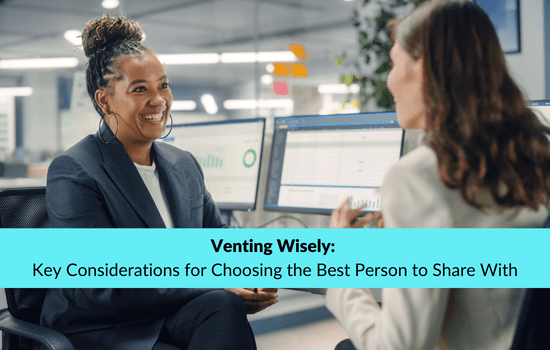How often do you confide in someone seeking feedback when you feel a negative emotion taking over? When you select the right person, venting wisely about a challenging and emotional situation can provide significant relief and enhance your well-being.
Choosing Your Confidant: Strategies for Selecting the Ideal Person to Vent To
Is Venting Helpful or Harmful?

Venting can have both positive and negative effects, depending on how you approach it and the context in which it occurs. Here are some considerations regarding the helpfulness of venting:
In our daily lives, we often encounter situations that leave us feeling frustrated, overwhelmed, or emotionally charged. The need to express these pent-up emotions is natural, and venting can provide relief and validation. However, the choice of whom we confide in plays a vital role in the impact venting has on our well-being and relationships. Selecting the right person to share our thoughts and feelings with is crucial for a positive and constructive venting experience. In this blog post, we will explore critical considerations for choosing the best person to confide in, ensuring that venting becomes a tool for growth, support, and effective problem-solving. We can enhance our emotional well-being and nurture healthier connections by venting wisely.
Finding a Balance When it Comes to Venting
As much as we all need to vent, it's a good idea to evaluate how much time we spend venting and how much is moving us toward a solution instead of reinforcing an unproductive habit. Psychology professor Dr. Brad Bushman determined from his 2001 study that venting to reduce anger is like using gasoline to put out a fire—it only feeds the flame. By fueling aggressive thoughts and feelings, venting also increases aggressive responses.
Strategically Select Who You Ask for Feedback
One strategic way to move forward is to speak with someone who is not emotionally invested in your conflict. For example, if you’re having an issue with a team member at work, it’s best to not talk to other colleagues whether they’re directly involved in the project or not, because they’re emotionally tied to the same work you’re doing in one way or another. Their feedback may be biased if they are connected to personal opinions rather than an external objective view.
Avoid selecting an individual you know will agree with you. Yes, It's easy to do because often, the first person who comes to mind is someone you like and who likes you. Don't be afraid to ask someone you don't always agree with for their feedback, as these individuals can often be the most objective advisors.
Seven Tips for Selecting the Perfect Venting Partner
When seeking someone to confide in, consider the following tips to find the best person for you:
- Look for someone you can trust with your personal thoughts and feelings. Choose someone who demonstrates integrity, reliability and a genuine concern for your well-being.
- Find someone who will listen without judgment or criticism. Confiding in someone who creates a safe and supportive space to express yourself freely is essential.
- Seek someone who shows empathy and understands your emotions and experiences. Someone who can put themselves in your shoes and offer compassion can provide valuable support.
- Look for someone who actively listens, pays attention, and shows genuine interest in your words. A good listener can provide insightful feedback and ask relevant questions that help you explore your thoughts and emotions.
- Consider a person who reciprocates trust and openness. A balanced and healthy relationship involves both giving and receiving support. Ensure that the person is willing to listen to your concerns as well.
- While not necessary, sharing some common values and perspectives can facilitate better understanding and support. It can help to confide in someone who can relate to your experiences and provide meaningful insights.
- Confiding in a professional, such as a therapist, counsellor, or coach, may be beneficial in certain situations. They have the expertise to guide you through challenges and provide objective support.
Selecting the right person to confide in is critical to venting wisely. Emotions are powerful, so receiving the best possible feedback will help you move forward and enhance your well-being. You can learn how to implement these skills or others through my consulting opportunities and emotional intelligence training.
This article was originally published on March 30, 2019, and has been updated (July 2023).
More Motivational Reads Here »
Are you Emotionally Intelligent?
Sign up for Linda’s monthly tips to build your Emotional Intelligence and reduce Emotional Hijacking!

















